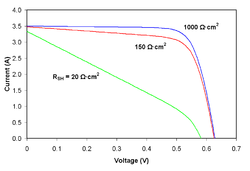
Effect of shunt resistance on the current–voltage characteristics of a solar cell
As shunt resistance decreases, the current diverted through the shunt resistor increases for a given level of junction voltage. The result is that the voltage-controlled portion of the I-V curve begins to sag toward the origin, producing a significant decrease in the terminal current I and a slight reduction in VOC. Very low values of RSH will produce a significant reduction in VOC. Much as in the case of a high series resistance, a badly shunted solar cell will take on operating characteristics similar to those of a resistor. These effects are shown for crystalline silicon solar cells in the I-V curves displayed in the figure to the right.

No comments:
Post a Comment